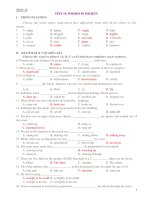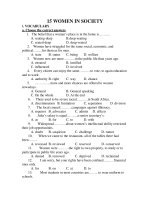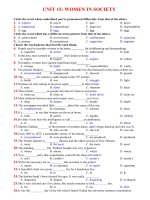15 WOMEN IN SOCIETY potx
Bạn đang xem bản rút gọn của tài liệu. Xem và tải ngay bản đầy đủ của tài liệu tại đây (68.56 KB, 5 trang )
15 WOMEN IN SOCIETY
I. VOCABULARY
a. Choose the correct answers.
1. The belief that a woman’s place is in the home is……….
A. seating-deep B.deep-seating
C. seated-deep D. deep-seated
2. Women have struggled for the same social, economic, and
political…… for them as for men.
A. state B. status C. being D. welfare
3. Women now are more……….in the public life than years ago.
A. ensured B. instilled
C. influenced D. involved
4. Every citizen can enjoy the same……….to vote, to again education
and to work.
A. authority B. right C. way D. chance
5. …………, more and more chances are offered to women
nowadays.
A. General B. General speaking
C. On the whole D. At the end
6. There used to be severe racial……….in South Africa.
A. discrimination B. limitation C. separation D. division
7. The local council……….campaigns against illiteracy.
A. requires B. advocates C. admits D. affects
8. Julia’s salary is equal………a senior secretary’s.
A. as B. for C. to D. with
9. Widespread……… about women’s intellectual ability restricted
their job opportunities.
A. doubt B. suspicion C. challenge D. rumor
10. When we came to the restaurant, all of the tables there had
been……
A. reveesed B. reviewed C. reserved D. conserved
11. Women were……….the right to own property, to study or to
participate in public life years ago.
A. denied B. removed C. deprived D. reclaimed
12. I am sorry, but your rights have been confined………financial
ones only.
A. for B. on C. at D. to
13. Most students in most countries are…… to wear uniform to
schools.
A. forced B. inquired C. compelled D. pledged
14. The reporters were……….from the area due to the security.
A. prevented B. protected C. blocked D. barred
15. He earned a lot working as a……….for a multi-national
company.
A. presenter B. representative C. writer D. controler
16. Women used to have……….or no access to education.
A. little B. few C. any D. some
17. Guests usually have to ask hosts or hostesses for………before
lighting cigarettes.
A. admission B. acceptance
C. permission D. understanding.
18. He has struggle for years to achieve a good………
A. property B. status C. condition D. base
19. When the results were announced, I felt as if a……….had been
lifted from my shoulders.
A. pressure B. stress C. load D. burden
20. To sum ……… , everybody has to observe the aformentioned
regulations.
A. up B. in C. off D. out
21. I believe that the fashion will soon………
A. work out B. catch on C. turn in D. make up
22. There is always a ………between generations.
A. distance B. blank C. gap D. space
23. Thanks to the ……….labor-saving devices, women are free from
housework.
A. mechanized B. mechanic
C. machinary D. mechanism
24. She ……… his remarks and went on with her speech.
A. overlooked B. over-reacted C. oversaw D. overturn
25. Women were confined to the domestic sphere……….most of
Western history.
A. throughout B. into C. among D. over
b. Word forms: Writer the correct form of the words in the
brackets.
1. That kind of medicine has not been ( legal)……….
2. I don’t like to travel to countries where there is a
(politics)………crisis.
3. Women’s (liberate)………movement has freed a lot of women from
the (end)…… cycle of child bearing and rearing.
4. Women in many countries have now obtained (equal)…….and
(recognize)……….in the society.
5. Jim worked as a (present)………for our company for ten years.
6. In her CV, she didn’t mention her (marry)………status.
7. She (vary)………arrives late for any meeting. It is time you had a
word with her.
8. Standards in education have received a lot of (public)………over the
last few years.
9. (Regard)………of your experirnce, you have to take the training from
the beginning.
10. When studying and working abroad, you may encounter certain
cultural (bar)………
II. GRAMMAR: VERBS + PREPOSITIONS
ADVERBIAL CLAUSES OF MANNER
a. Fill in each blank with one preposition.
1. Could you please explain the lesson………Kate?
2. Poor Fiona! She is always laughed………by classmates.
3. When asked about the wedding date, Linda glanced……….me
waiting……….the answer.
4. Helen dropped……….to say goodbye……….us. She is
leaving………Colchester.
5. The warden stopped the boy……throwing stones……the peacocks.
6. What did the neighbors argue………?
The Wilson’s lawn-mower dug……….theJohnson’s garden
7. Gina sticks……….her first plan and overlooks other plans.
8. Her problems at school stern………her conflicts at home.
9. You should expose these plants…… the sun. They need sunlight,
10. She is sad because she can not quality………the next competition.
b. Put the verbs into correct forms.
1. Mom treated my friend, Mark as if he (be)…… a member of the
family.
2. You should have done it as you (tell)………
3. I signed in the petition as other colleagues (do)……
4. I am sick. I feel as if the room (spin)………
5. He ignored and walked past me as though we (not meet)……before.
6. Maria has just made friend with Barbara. However, they are very
close to each other as if they (be)………friends for years.
7. I don’t like to run the shop the way my father (do)…… for years.
8. Don’t worry about the procedures. Do as they (instruct)…… you.
9. The children were so excited to go to the zoo as if they (never
go)…….there before.
10. The woman spoke unclearly as though she (chew)…….something.
III. READING
Choose the best answer to fill in each blank.
It may be that women were fighting back for equality (1)………than we
thought. For hunderds of years, people thought that ancient Greek stories
of fierce warrior women called Amazons (2)…… false. However,
research has shown that a group of women did perhapsexist in ancient
times, in Turkey and around the Black sea. Recently, in Pokrova in
Russia, researchers found the bodies of 50 women buried as (3)…… as
600 B.C with their weapons.
Although women today have more rights than before, there is still a long
way to go before women can enjoy equality with men. Women,
(4)…… , earn 30 to 40% less than men. Also, fewer women have
(5)…… job. In Asia, only one percent of executives are women.
Women get less money (6)……winning sports competitions. Men also
have far more opportunities for power than women. In Japan, less than
7% of people in government are women – the (7)………of any
(8)………nation. In some countries, such as Kuwait, women still cannot
vote. In many cultures, there is still a (9)……….belief that a son is better
than a daughter. In countries like India and China, this cause a great
(10)………in the population, as there now many more boys than girls.
1. A. much later B. later more
C. much earlier D. earlier much
2. A. are B. were C. was D. are
3. A. far B. soon C. long ago D. well
4. A. in short B. at most C. on average D. by far
5. A. special B. occupied C. expert D. professional
6. A. by B. of C. for D. at
7. A. lowest B. slowest C. least D. farthest
8. A. developing B. developed
C. underdeveloped D. undeveloped
9. A. big B. large C. hard D. strong
10. A. interchange B. deterioration
C. division D. enhancerment
ANSWER
I.
a. 1.D 2.B 3.D 4.B 5.C 6.A 7.B 8.C 9.A 10.C
11.A 12.D 13.C 14.D 15B 16A 17.C 18.B 19.D 20.A
21.B 22.C 23.A 24.A 25.A
b.
1. legalied 6. marital
2. political 7. invariably
3. liberation ; endless 8. piblicity
4. equality ; recognition 9. regardless
5. representative 10. barriers
II.
a. 1. were 6. had been
2. had been told 7. has done / did
3. did 8. instruct / have instructed
4. were spinning 9. had never gone
5. had not met 10. were chewing
III.
1.C 2.B 3.C 4.C 5.D 6.C 7.A 8.B 9.D 10.C
Họ và tên: VŨ LỆ THỦY
Lớp : 12A









